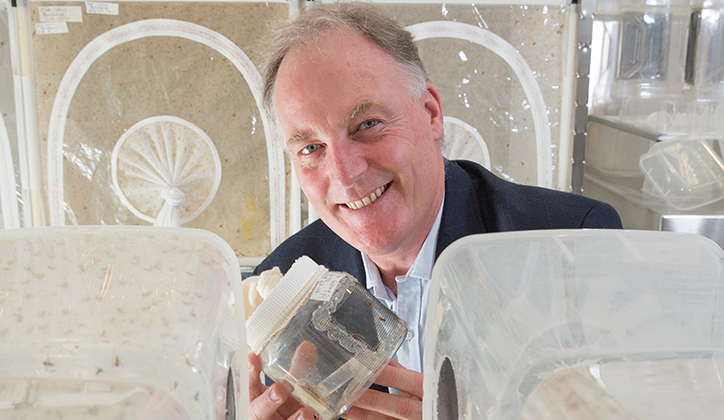Behavioral biologist Associate Professor Phil Taylor has been recruiting fruit flies as ‘double agents’ for years – a skill that has now seen him bring Macquarie into the $22 million industry and government ‘SIT-Plus’ consortium, established to address Australia’s Queensland Fruit Fly (or Q-fly) pest problem.
Developing sterile insect technology (SIT) to alleviate the impact of the Q-fly, the SITPlus team includes Horticulture Australia Ltd, Primary Industries and Regions South Australia, CSIRO, Plant & Food Research Australia, New South Wales Department of Primary Industries, South Australian Research and Development Institute and now Macquarie University.
“It is terrific to see Macquarie chosen as a research collaborator in this important project,” says Deputy Vice-Chancellor (Research) Professor Sakkie Pretorius. “The outcomes of this consortium will be vital to Australia’s $6.9 billion horticultural industries, and I commend Phil’s team for sharing their world-recognised knowledge in this way.”
The SITPlus program is committed to a strategic, coordinated and national approach to Qfly management.
“Fruit flies damage fruit and vegetables globally with huge implications for food security, rural economies and subsistence crops,” says Phil.
“If you’re talking to a horticulturalist or farmer, they’re desperate for help to protect their crops with environmentally benign practises. The methods they’ve used for the last 40-50 years are now largely prohibited, and so they’re turning to science for solutions.”
Drawing on the Macquarie team’s fundamental knowledge of the behaviour of pest species, the SITPlus consortium will develop new control methods that take advantage of that knowledge.
“We’re really out to make double agents of the Q-flies,” says Phil, “rearing and sterilizing millions of males in a factory and releasing them into the field to corrupt the reproductive systems of pest females. It sounds harsh, but it’s a far more benign option than the pesticides we’ve used for many years!”
Phil, who has been at Macquarie since 2002, is excited for the future of his Q-fly research amongst the SIT-Plus consortium.
“I’m keen to build bridges for early career researchers to join us in this research,” he says, “because it’s an opportunity to use fundamental science – the knowledge of the animal and theoretical basic science – to find meaningful and useful real world solutions.
“I’d like to be able to look back and see that the research in my lab has made a major contribution to a sustainable horticulture management.”
Within the initial five-year timeframe, Macquarie University will become a partner of a new SITPlus factory being built in Port Augusta. Phil’s team will be developing methods for factory production of high quality sterile flies to protect South Australia’s fruit-fly-free status, while understanding how this technology could be rolled out elsewhere.

